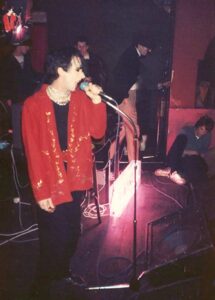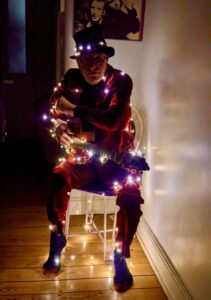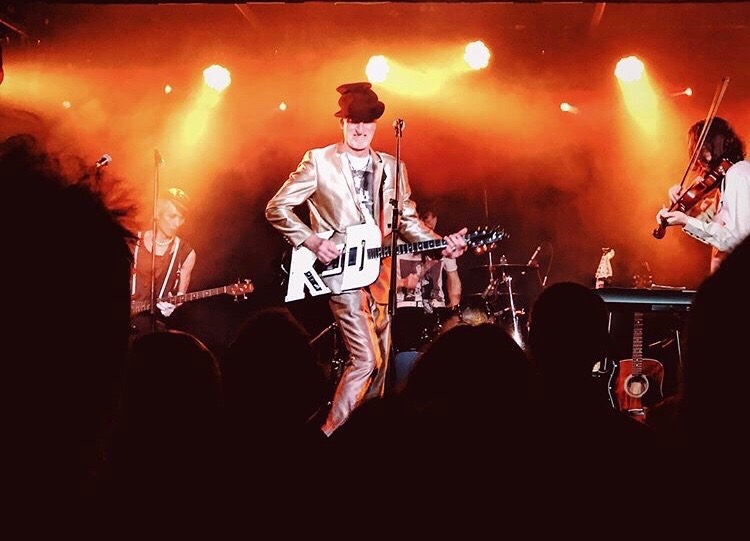Richard Strange has a habit of describing himself as a “failed pop star”, but there doesn’t seem to be an ounce of self pity in him doing so. He may not be a household name, but writer, musician and performer Strange, formerly lead singer with British proto-punk outfit Doctors of Madness, revels in all the strange and wonderful opportunities that his career has thrown at him.
“It’s a blessed life I’ve had as a failed pop star,” Strange says. “I say blessed because I’ve failed. I’ve known people who had one hit, and they’ve managed to eke out a living on that one hit for 40 years. Without a great deal of enjoyment I suspect, and without a great deal of artistic or creative satisfaction, but it’s paid the rent and you can understand people doing that. Doctors of Madness ultimately failed because we were a pop band and we weren’t popular enough.”
Of course, failure and success are highly subjective terms. Strange and his band are still spoken of in reverential tones by the cognoscenti, and the man himself exudes an unimpaired joie de vivre, sharing his stack of anecdotes with evident delight. If that’s failure, we should all be so lucky.

Richard Strange in Batman
Now, Strange is embarking on a tour of his career-overview one-man show An Accent Waiting to Happen, touching down at The Talleyrand in Levenshulme, which he promises will be “a celebration, or a recollection, a sharing of memories. I’ll be showing film clips, singing songs, telling stories and spreading vicious rumours.”
For example, he might discuss stumbling into an unplanned side-career as an actor, with his distinctive features popping up in everything from Gangs of New York, Robin Hood: Prince of Thieves and Harry Potter and the Deathly Hallows to Lovejoy and Men Behaving Badly. He was even one of the Joker’s attendant goons in Tim Burton’s 1989 blockbuster Batman.
“Watching Jack Nicholson do six takes of the same scene in two hours as the Joker is like a masterclass,” he says. “Getting your make-up put on in the next chair to Jack Nicholson…it was a brilliant, brilliant opportunity. To go back to being a failed rock star, If I’d had that one hit, I wouldn’t have been in that chair next to Jack. I wouldn’t have been in that film. I wouldn’t have needed to, and contractually I probably wouldn’t have been able to. Or I wouldn’t have had the time, because I’d have had a gig in Cleethorpes or something.”
Doctors of Madness
Back in the mid-70s, after a few embryonic early gigs, Doctors of Madness were signed up by Pink Floyd/T-Rex manager Bryan Morrison, whose excellent connections saw them making their first TV appearance on The Twiggy Show where they gave a dark, intense, guitar and violin-fuelled performance of the eponymous Doctors of Madness . “We will never be a fun band,” Strange says. “We were a doom band – a feel-bad band. We were Doctor Feelbad.”

Strange performing. Used with permission from Richard Strange.
The group went on to record three albums between 1975 and 1978, a period of huge change in the UK music scene as art rock, prog and garage rock evolved into – or perhaps, gave way to – punk. “We were sort of doing punk rock before it had a name,” Strange says. “Then when punk rock came along and had a name, we didn’t quite fit into it. We were maybe three years too old, and pop music loves novelty. Suddenly a new generation of bands come along and it’s called punk rock or it’s called New Wave or whatever it is. You can either try to hitch yourself to that bandwagon or you can accept the fact that the boat has sailed.”
That’s not to say that the punk generation didn’t connect with Doctors of Madness, though. “The Sex Pistols supported us, The Jam supported us, Joy Division supported us, Simple Minds, The Adverts, The Skids – they all supported us. But that came to an end and suddenly I was sort of left high and dry.”
At the age of 27, Strange found himself looking for a new direction to take.
“Post-Doctors of Madness, I thought ‘well, what am I good at? I’m a good songwriter. I’m a good performer. I can conceptualise a show, I can interact with the public, I can organise.’ So I had an idea for a one-man show called The Phenomenal Rise of Richard Strange, in which I imagined, what if sometime in the future someone comes from show-business, from pop music or the movie industry, and by using the techniques that they’ve learned for crowd manipulation, for PR, for marketing, promotion, whatever you want to call it, that person becomes president of an imaginary united Europe? It was a political fantasy about using showbiz techniques to take power. Little did I know 30 years later it would be common practice all over the world “
Having toured The Phenomenal Rise of Richard Strange to appreciative audiences, Strange found himself twiddling his thumbs back in London as the 80s dawned.
“By then I didn’t want to be doing what I was doing in the same places I used to play before. I didn’t want to be going into Rafters, into the Electric Circus, The Marquee Club, the 100 Club, plying this new idea, as if it doesn’t really have any original features or nothing that identifies as being something different from what I did before. So I thought the only thing I could do in that case was to start my own club.”

Marc Almond and Soft Cell at Cabaret Futura 1981. Background Shane McGowan and Richard Strange. Used with permission from Richard Strange.
The result was Cabaret Futura, a mixed-media club night in Soho that ran weekly from December 1980. It proved to be an influential venue, embodying the arty zeitgeist of New Romantic-era London.
“This is before there was internet, before there was broadband, before there was social media, before there was MTV, before there was any of those easy shortcuts for getting things known. So it all had to be done analogue: posters, word of mouth, little ads in magazines, phone calls to friends and so on. Cassettes were sent to me every day by hopeful bands or poets or comedians who wanted to get a gig. Suddenly I was up and running again. I was putting this thing on, and it became the hottest thing in London. I put on Depeche Mode for ten quid, Soft Cell for 12 quid. The Pogues did their first gig there. It was great fun.”
The next steps
Every since then, Strange’s life has carried on cantering off in fascinating creative directions. He toured the world in a stage production of Hamlet as a gravedigger alongside James Nesbitt, and worked with Marianne Faithful on the stage show The Black Rider, a collaboration between Tom Waits, William Burroughs and director Robert Wilson. If he wasn’t doing that, or hobnobbing with Jack Nicholson, he was appearing as the butler in the hit German version of Noel’s House Party.
After 41 years he also made a belated fourth Doctors of Madness album, Dark Times, in 2019, with legendary Stone Roses/Radiohead producer John Leckie, to some of the best reviews of his career. The album included contributions from Def Leppard’s Joe Elliott, a life-long Strange devotee, and Japanese power duo Sister Paul, originally a Doctors of Madness tribute act, who have since, brilliantly, been touring with Strange as members of the actual band.
Strange has also found time to raise a family and he’s been lecturing on Creativity in Context for Tileyard Education for more than 20 years. “I talk about creativity and daring to fail. I think daring to fail, daring to take risks, is probably the most important thing in the arts, because if you don’t, you’ll never make original work. All you’ll do is rehash something that’s gone before. The one certainty of fearing to fail is you’ll never made anything original.”
As for his status as a supposed failed pop star from his time fronting Doctors of Madness, Strange says: “You could put it down to any number of things, but mainly bad luck, bad timing. I think we were talented and we’ve proved to be influential. Only history can tell you whether that is the case, but I’ve had enough testimonials from Julian Copes and Primal Screams and Vic Reeveses to let me know that we made an impression.”

Richard Strange. Credit: Mackenzie Dearsley.
Nevertheless, Strange clearly has no regrets whatsoever. “Oh, I’ve been blessed. And that’s what this show is – it’s almost like me pinching myself and saying, ‘did this really happen in this last 45 years? Did I really manage to do all this, and to find a fantastic partner? I’ve had kids, and good health for the most part. And to have worked with or met so many of the great people in the arts of my generation…no, no regrets.”
Main image used with permission from Richard Strange
Richard Strange: An Accent Waiting to Happen, comes to The Talleyrand, Levenshulme on February 3, 2023. For more information please click here.





